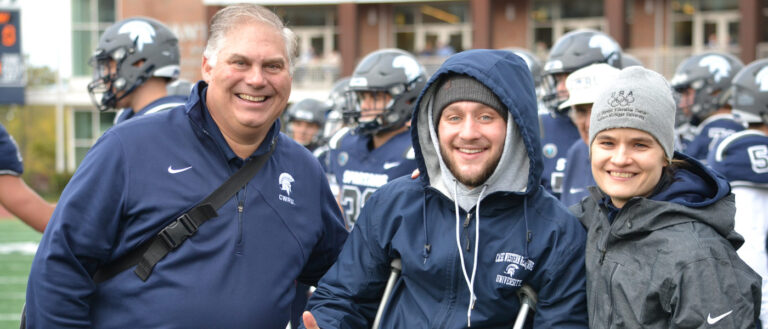Sports are integrated into every aspect of Jay Garfield’s day—from the moment he wakes up in the morning until his head hits the pillow at night. It’s a passion he’s had since high school, and it’s one he puts to use daily in his role as the head athletic trainer at Case Western Reserve University—a position he assumed in July.
Here, his job is to help the university’s student-athletes heal from injuries and stay healthy. But if you ask Garfield, he wouldn’t consider it a chore.
“It’s not work if you enjoy what you’re doing,” he said.
Early on, Garfield knew his passion for athletics was leading him toward this career path. Drawn also to medicine and the desire to help others, Garfield felt athletic training was the best way to combine his interests.
That led him to Hiram College, where he graduated with degrees in art/photography and exercise and sports science in 1993. His career included stops at Keisel Physical Therapy and Sports Medicine, University Suburban Sports Medicine working with Brush High School in Lyndhurst and finally Notre Dame College in South Euclid. He also covered the Amateur Athletic Union Junior Olympics in 1999 and the Cleveland Barons U18 Elite Hockey Team from 2011 to 2013.
As a former athlete who played football, basketball and baseball in high school and baseball in college, Garfield knows the impact a trainer can have on an athlete’s life. It was a shoulder injury that led Garfield to see the team trainer, Tom McLaughlin, at Cleveland Heights High School during his days as a student.
Years later, working at his first sporting event as a trainer at Case Western Reserve, McLaughlin was there and recognized the former student-athlete he once helped get back on the field. Garfield called the full-circle moment “incredible.”
Now, he’s the one helping injured student-athletes on the mend.
“You see an athlete at possibly the worst moment of their athletic career and you get to scoop them up and protect them and heal them and then watch them come back,” he said, explaining that he never tires of that process, calling each experience working with an athlete “immensely rewarding.”
He aims to make an impact on all of the student-athletes he works with, just as McLaughlin did for him.
When he came to Case Western Reserve in January 2020, Garfield found the university’s athletes driven to understand everything that went into their treatment.
“They listen and then and they absorb it, and they want to know everything and it’s great,” he said.
But even when he has time off from his job, sports are still at the center of Garfield’s world. If you’re ever looking for him when he’s not on the sidelines of a CWRU sporting event, head to the nearest golf course and you just might find him.
Make sure to head out to a CWRU athletic event soon to see Garfield helping our students. But first, read his answers to this week’s five questions.
1. What’s the most thought-provoking class you’ve ever taken?
A leadership class. Out of the entire master’s program [I completed], that probably was one of those courses that helped me the most to do what I’m doing now.
2. Where is the best place to spend a day in Cleveland?
There’s nothing better for me than to spend a day at the ballpark, but there’s also nothing better than to spend a day on the golf course as well. And then there’s such great things in Cleveland, like the zoo and the James A. Garfield National Historic Site [President Garfield is Garfield’s great, great grandfather]. I’m a Cleveland kid and there’s so many things that I love to do. But I would say at this point in my world, golf would be the No. 1 thing. So on any one of our great golf courses in the Cleveland area is where I would probably be found.
3. How do you like to start your day?
Usually I turn on SportsCenter to see what I missed while I was sleeping. I also watch the news. So, just getting up and hearing things that are going on in the world—between the athletics and the actual news—and then get to work and get going.
4. What is the best advice you ever received?
Never bring your work home, and that was actually from my grandfather—my dad’s dad. He was a very prominent man in Cleveland and he was very big on work is work and home is home and you need to separate the two.
5. What’s your favorite thing about Case Western Reserve?
Everybody, including the students, are such nice people and they’ve been so welcoming. I think that even with all that we’ve been through, the staff, the faculty and the students have done an amazing job of changing what needs to be changed and doing it with a smile on their faces—and not a lot of places do that.


